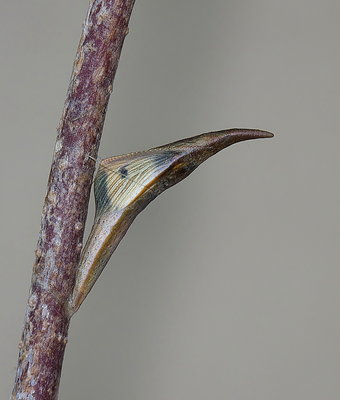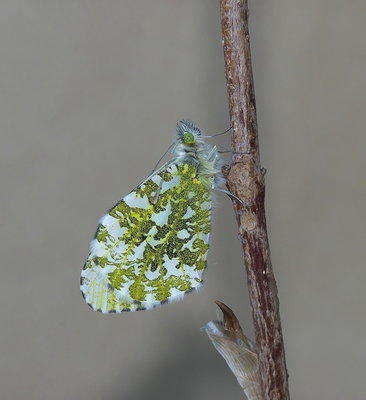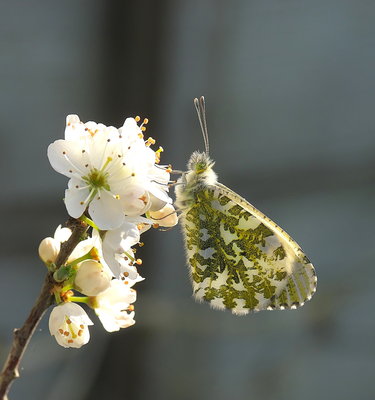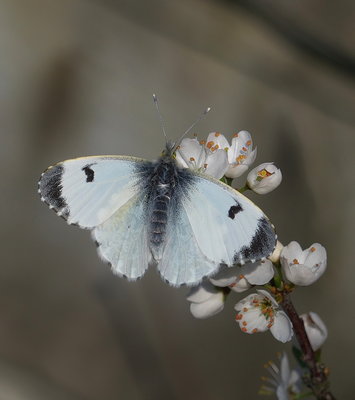Page 59 of 79
Re: Maximus
Posted: Sat Nov 24, 2018 6:12 pm
by Maximus
Thanks BB, and thanks for the ID.
Thanks, Wurzel, the shot of the SWA was taken through a hedge, as I couldn’t easily get around to the other side without disturbing the butterfly.
Thanks, David, yes the female Sooty Copper was very fresh.
Hi, Old Wolf, France is a beautiful place to visit, with astounding numbers and diversity of butterfly species.
Seeing the roosting bats was amazing, something I’ve not seen before.
Brenne continued
While I hung around in the first field, Cathy had moved on along the track and was no longer in sight. After about fifteen minutes she returned, out of breath, to tell me that she had found another field further along the track, which was full of butterflies. We both hurried along and were soon standing at the entrance to the field shown in the following shot.
It was actually the bed of a dried up lake, and it was covered with the tall flowering spikes of Purple Loosestrife. Nectaring on these flowers were dozens of Broad-bordered Bee Hawk-moths, I couldn’t believe just how many there were (but very difficult to photograph)! In addition I could see that there were plenty of various butterfly species enjoying the nectar of both the Loosestrife, and the clusters of the small pinky-white flowers on the sagging stems of Pale Smartweed – a member of the Knotweed family.

- Broad-bordered Bee Hawk-moth.

- Broad-bordered Bee Hawk-moth.
I then spotted a larger moth nectaring nearby, which on closer inspection turned out to be a Jersey Tiger.

- Jersey Tiger Moth.

- Jersey Tiger Moth.
There were lots of Brimstones, Green-veined Whites and Clouded Yellows.

- Brimstone female.

- Green-veined White.

- Clouded Yellow.
Glanville and Spotted Fritillaries.

- Glanville Fritillary.

- Spotted Fritillary.

- Spotted Fritillary male.
And some lovely fresh female Holly Blues.

- Holly Blue female.

- Holly Blue female.
All too soon it was time for us to move on in order to reach our final overnight stopping point in Normandy. In any case the harsh midday sun was making the butterflies hyperactive and there was no shade for us in the 30 degree heat. So we headed back to the car for a drink and, nectaring in the Buddleia next to the car was a Southern White Admiral.

- Southern White Admiral.
The Brenne is such a stunning part of France that it really needs more time to explore it more fully. Next time for sure.
Re: Maximus
Posted: Sun Nov 25, 2018 6:17 pm
by Wurzel
More great reportage Mike cracking shots as always and another brill SWA


I'd love to have driven through France and seen various different areas as you did


I need to get back to France...
Have a goodun
Wurzel
Re: Maximus
Posted: Wed Nov 28, 2018 6:11 pm
by Maximus
Thanks, Wurzel, you're always very generous with your comments

I'd like to drive through France again, but be a bit more informed about where to visit, and decide exactly what species I'd like to see

Like the Woodland Brown and Alcon Blue, for example

After leaving the Brenne we drove to Lower Normandy, reaching our overnight stop-off point quite late. The following morning we set off to a reserve that we’d previously only visited in the winter, when we went to see it’s Red Squirrels, which are found in the deciduous woodland that borders it. When we arrived at the gate we met the warden, who was checking on the grazing animals who keep the reserve in shape. When he found out we were interested in butterflies, he quickly produced his copy of the Lafrancis ‘Papillions De France’, to kindly show us what we could expect to see. After a quick chat, we thanked him and set off into the beautiful meadow shown in the following photo.
The guardians of the meadow.
We soon began to see plenty of butterflies, but, as it was very warm they were mostly quite lively.

- Weavers (Violet) Fritillary.

- Swallowtail.

- Swallowtail.

- Silver-washed Fritillary, male.

- Wood White.

- Gatekeeper, female.

- Ringlet.

- Meadow Brown.

- Silver Y Moth.
A great morning spent in a beautiful French meadow full of butterflies - but now we had a ferry to catch.
Re: Maximus
Posted: Thu Nov 29, 2018 10:15 am
by Andrew555
Absolutely fantastic selections from France Mike!


What a beautiful range of species, and all very well captured.

Cheers
Re: Maximus
Posted: Fri Nov 30, 2018 11:40 pm
by Wurzel
Credit where credit is due Mike

I like the sound of Alcon Blue and Woodland Brown


Have a goodun
Wurzel
Re: Maximus
Posted: Sat Dec 01, 2018 6:57 am
by David M
That meadow looks very appetising, Mike. Wouldn't it be lovely if we had Swallowtails fluttering around ours?
Good luck with your aim to see Woodland Brown. This is one of the fastest disappearing species in France, sadly.

Re: Maximus
Posted: Mon Dec 31, 2018 5:03 pm
by Maximus
Thanks Andrew, Wurzel and David.
A Fieldfare in the garden
When the beast from the east struck in March this year, we were privileged to have the company of this lovely bird for the three days that the snow lay on the ground. We provided him/her with a diet of apples which were readily consumed. Any other birds that ventured into the garden were quickly chased out by this winter visitor. He was however very easy going with us and would stay put in the bush when we were replacing the apple halves.
He spent the nights roosting in a bush at the bottom of the garden.
When the thaw came he moved on, and we were sorry to see him go.
As this is my last dairy entry of 2018, I would like to wish everyone on UKB a very happy, healthy, and butterfly filled 2019.
Re: Maximus
Posted: Tue Jan 01, 2019 6:01 pm
by Neil Freeman
Great photos of the Fieldfare, I never manage to get close to them.
Hope you have a great 2019 too and get to see everything you wish for.
Cheers,
Neil.
Re: Maximus
Posted: Tue Jan 01, 2019 8:30 pm
by Wurzel
I concur with Neil - great photos of a very charismatic bird - a lot less shy than their smaller cousin the Redwings.

If the Beast makes a return visit then we can expect a few more of these

Have a cracking 2019 yourself Mike

Have a goodun
Wurzel
Re: Maximus
Posted: Tue Jan 01, 2019 9:13 pm
by David M
Beautiful bird, Mike, and how kind of him to book in
chez toi on his travels!

Re: Maximus
Posted: Sun Feb 24, 2019 6:08 pm
by Maximus
Thanks, Neil, Wurzel and David.
Underway at last
We spent couple of enjoyable hours today walking our local patch in the warm February sun. Our first sighting of 2019 was of a Brimstone, (followed by at least 6 others). As they weren’t really stopping this was the best record shot I could manage.
Also seen were several Peacocks nectaring on Heather, and a lone Comma which had the Viburnum blossom, all to itself.
It’s great to get out again, and seeing these beauties really made our day.
Re: Maximus
Posted: Sun Feb 24, 2019 6:11 pm
by millerd
Those Peacocks don't appear to have suffered one bit from probably having been tucked up in the dark somewhere since July. Splendid insects!
Dave
Re: Maximus
Posted: Mon Feb 25, 2019 6:01 pm
by David M
Great way to herald the new season, Mike. I know what you mean regarding Brimstones being constantly on the move though...

You should have put a warning on that second Peacock image however - I had to reach for my sunglasses!

Re: Maximus
Posted: Mon Feb 25, 2019 8:09 pm
by trevor
Good to see you out of hibernation as well, Mike.
Lovely shots as always. Great Peacock images.
All the best,
Trevor.
Re: Maximus
Posted: Mon Feb 25, 2019 10:16 pm
by bugboy
Great shots, especially the Peacocks, still awaiting to find one of those. I don't think this site has ever been this busy so early in the year

Re: Maximus
Posted: Sun Mar 24, 2019 6:52 pm
by Maximus
Thanks, Dave, David, Trevor and Bugboy for your comments

A female Brimstone paused just long enough for a photo in our garden this afternoon.
Males were seen just passing through, both yesterday and today, probably looking for this female

Two Peacocks were also seen spiralling upwards locked in combat.
Re: Maximus
Posted: Mon Mar 25, 2019 10:26 pm
by Wurzel
Cracking set of Peacock shots Mike

And that female Brimstone is a great capture particularly at this time of year


Fingers crossed the promised 'spring weather' continues...
Have a goodun
Wurzel
Re: Maximus
Posted: Tue Mar 26, 2019 8:22 am
by David M
Nice image, Mike. If only the males were as co-operative!
It's always nice when they settle on blue flowers....usually I see them on primroses or dandelions where the effect isn't quite the same.
Re: Maximus
Posted: Sun Mar 31, 2019 4:42 pm
by Maximus
Thanks, Wurzel, it looks like it may cool down a bit next week

It was nice to see the Brimstone on the Grape Hyacinths, David, Bluebells would also be good.
Having been incapacitated by an evil bug over the last over the last few days, I have been unable to get out and make the most of the recent spell of warm weather.
During this period however,on 29th March, one of the two Orange-tips which we ‘rescued’ as cats from our garden last June, decided that it was time to emerge (we had loads of cats on our Garlic Mustard, but most were predated) giving me some respite my malaise


- 22 1/2 hours before emergence.

- 10 minutes after emergence.

- Wings hardening, 26 mins after emergence.

- Open wings just before taking flight,40 mins after emergence.
She left it a bit late in the day emerging at 3.45pm, as I’ve found in that they tend to emerge in the morning. However she was lucky, as the sun was still warm enough for her to take flight, forty minutes after emerging.
Re: Maximus
Posted: Sun Mar 31, 2019 5:39 pm
by trevor
Beautiful sequence Mike. When you have a bad bug, a nice bug can be good therapy!.
Get well soon,
Trevor.